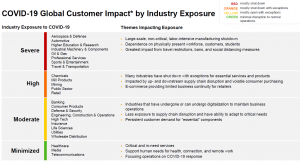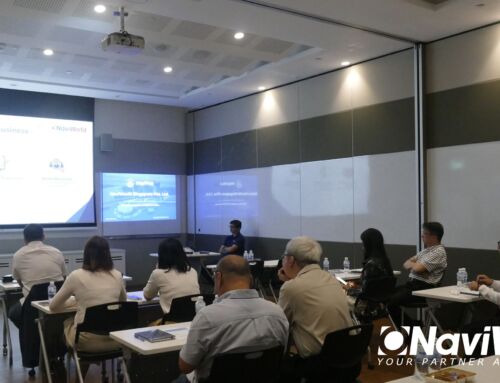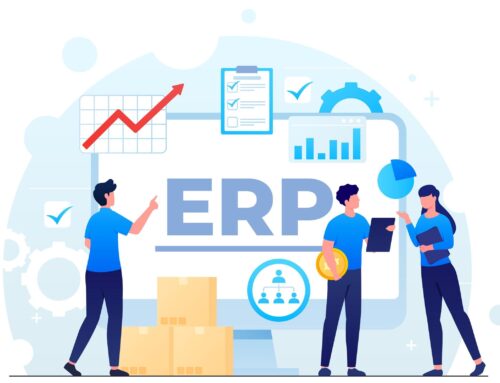Surviving Post COVID-19 with ERP
Introduction
From January 2020, Singapore companies began to feel the impact of the COVID-19. The earliest problem came from the supply chain. That was when companies realised that they could not fulfil or had to delay orders. Eventually, their suppliers in China stopped production. Then, the transportation sectors in China went into lockdown. And the effect rippled downstream to the suppliers in other countries.
Next came the banning of flights between countries. Even face-to-face discussion and meetings became a non-permissible task.
By March 2020, many of the businesses had to operate under partial capacity. Eventually, non-essential services and enterprises had to seize operations or change the way of work.
Some companies were more fortunate; they were able to have their employees work from home. Some could not even operate.
Internet traffic increased exponentially. And it did not help when Internet Services from Starhub went down on 8 April 2020—disrupting those who worked from home. Then on 12 May 2020, the same internet disruption happened to M1 subscribers.
The impact of COVID-19 will be a long term one. That’s why companies need to plan for surviving the Post COVID-19 period with ERP.
Those with Enterprise Resource Planning (ERP) will need to enhance their systems further to work efficiently under the new normal. Those without ERP will have to determine if they will need an ERP system. These companies need to learn how to use ERP to survive the post-COVID-19.
How Businesses are Affected by COVID-19
CMI experts analysed 25 industries from a global perspective. They assessed each industry’s resiliency to COVID-19. Subsequently, they came to some observations, which they published in their report “CMI State of the Market: Early Indicators of COVID-19 Impact,” on 10 April 2020.
So, what type of businesses were most severely impacted by the COVID-19:
- Businesses that deliver services and products to their customers through person-to-person contact (Except healthcare)
- Labour-intensive businesses (Except healthcare)
- Businesses that lack the option to operate with less human contact (For example, retailers who could not sell online)
In other words: “Human is an asset for businesses, but it is also the Weakest Link.”
Post COVID-19 New Normal in Surviving Post COVID-19 with ERP
COVID-19 had already changed our customers’ behaviour and how we operate our business. The impact of these changes can be found in the following areas:
- Customers had to purchase products and services online since they could not visit retail shops
- Companies started to realise the need to diversify their supply sources
- Companies recognised that it is necessary to have the ability for remote working
- Furthermore, companies realised the importance of automation to reduce their reliance on labour
- Organisations had to find ways to deliver their services and products remotely
CMI predicts the following changes to the business environment:
Demand for ERP Cloud Solutions to Accelerate and Survive Post COVID-19
What had been a regionalised cloud adoption trend will now become global and accelerate.
We should expect companies to exchange on-premises projects for cloud ones that can provide continuity from future crises.
Demand for Digital Transformation Initiatives to Accelerate
Companies will realise that the more digitalised their business, the more assurance of continuity when facing future global crises.
In general, companies with resilient IT budgets will have an advantage in digital transformation.
Companies to Embrace New Business Models that Favor Automation and Analytics
Supply chain/sourcing agility, contingent workforce management, and horizontal automation become more substantial business priorities.
Digitalisation and automation will enable companies to ensure continuity and remain competitive.
The Unique Singapore ERP Situation in Surviving Post COVID-19
Singapore companies are unique in many ways as compared to our regional and global competitors.
Small Local Market
We have a small local market. Trade activities with companies outside of Singapore are an essential part of our economy. And, we have to continue to be an open economy.
Singapore companies need access to resources globally, but also it means that we have to compete globally.
Due to the close tie with trades outside of Singapore, Singapore companies are open to regional or global disruptions.
Strong Infrastructure
Singapore has the most complete and advanced infrastructure in the Asia region and even when compared globally. We are a transportation hub of the Asia region that allows us to link to the rest of the world. Our IT and telecommunications are world-class.
Singapore’s robust infrastructure allows companies to access advanced technology at a reasonable cost easily and to compete globally.
Strong Government Support on ERP to Survive Post COVID-19
Singapore government is one of the few governments in the world that has the financial capacity to assist our companies. Our government is supporting companies to survive and thrive in the post-COVID-19 era. There are various short-term supports for Singapore companies to survive the current COVID-19 circuit breaker period.
To help Singapore companies prepare for the post-COVID-19 uptakes, the government had increased the support for Enterprise Development Grant (EDG) from 70% to 80%. This support will be valid from 1 April 2020 to 31 December 2020. For firms that are most severely impacted by COVID-19, the authority can further raise the maximum support level to 90% on a case-by-case basis. This grant is often utilised by Singapore companies to subsidise the cost of their Enterprise Resource Planning (ERP) projects.
How ERP Helps Companies in Surviving Post COVID-19
Many companies in Singapore had benefitted from the implementation of Enterprise Resource Planning solutions (ERP) in the last 30 years.
The new normal will present various challenges to companies. Therefore, ERP will help companies survive the Post COVID-19 period in the following ways:
Manage Rapid Changes
Changes will be fast, and companies need to adjust quickly. These changes may present in the following forms:
- Supplier Price Fluctuation
- Need for Alternate Sources and Comparison
- Sentiment change of Consumers and Customer
ERP will help to address these changes by:
- Using Analytics for quick management decision making
- Providing the power to rapidly update the pricing base on supplier sources and pricing information
- Creating the capability to compare alternate sources quickly
- Providing the ability to analyse the impact of the changes for inventory and cashflow Forecast
Reduce Reliance on Human Intervention
Human is becoming a liability and the weakest link in the post-COVID-19 era. The solution is to automate as many business processes as they are feasible to minimise manual work.
ERP can help companies in the following areas:
- Provide an integrated business process
- Integrate with e-commerce to enable companies to sell efficiently
- Integrate with the system of your 3rd party delivery contractors
- For manufacturing, companies may seriously consider adopting automation such as Industry 4.0 with integration to the ERP
- Integrate with warehouse bar code mobility and proof of delivery (POD) solution
Automate Routine Manual Processes
Companies should look into automating their routine manual processes. Automation will prevent disruption to everyday work when similar pandemics situation arises. The automation will allow management more rooms and attention to planning and managing crises.
Some of the areas that companies can automate or streamline include:
- AP Automation provides the ability for automating the vendor payment with approval control remotely
- Ability to send and receive Electronics Documents through gateways such as PEPPOL
- E-Payment through creating API link to banks, for receiving or making payment
- Industrial 4.0 and IoT to connect the ERP for automation of Manufacturing processes
- Artificial Intelligence to speed up decision making.
Enable Remote Working
In the post-COVID-19 period, remote working will become the new norm. ERP systems must integrate with other sub-systems for seamless business operations. Users must be able to access the ERP system outside of their company premises.
Companies can achieve remote access through the following methods:
- Adopt Cloud ERP
- Advantages
- Ease of remote access
- Flexibility to scale up or down
- Economical for smaller user count
- Minimum IT resources needed for maintenance
- Disadvantages
- May have restrictions for complex customisation and integration with external systems
- Costly for larger user count
- More expensive than a perpetual license in the long run
- Advantages
- Install ERP in a private cloud environment
- Advantages
- Ease of remote access
- Allow complex customisation and integration
- Easy to scale up the server resources
- Disadvantage
- More expensive as compare to hardware server in the long run
- Need IT resources for maintenance
- Advantages
- Set Up ERP from an on-premise server that enables remote access
- Advantages
- Cheaper than a subscription model in the long run
- Allow complex customisation and integration
- Disadvantage
- Need IT expertise to set up for remote access
- Difficult to scale up the server resources
- Need IT resources for maintenance
- Advantages
You may like to read our article on “Cloud ERP or On-Premise ERP – What you Need to Know” for more information.
Conclusions on ERP solutions in Surviving Post COVID-19
Singapore companies need to start planning and thinking about how they want to operate in the post-COVID-19 era. Many things have changed and are unlikely to return to what they used to be. Surviving post-COVID-19 with ERP is an important option.
The COVID-19 is offering the opportunity for forward-looking companies to thrive and compete in the new normal.
There are vast options for established ERP solutions available in Singapore. ERPs such as Microsoft Dynamics 365 Business Central and SAP Business One, are making it easy for companies to select and implement. If the choice is overwhelming, you may like to read our article on “How to Select ERP for SME” for more information.
COVID-19 will not be the last pandemics that we will face. Even when this is over, there will be other pandemics as we had experienced in history. Global warming will likely increase the frequency of epidemics. Companies should start to look into how to survive and even thrive in the COVID-19 era now and not wait until the next pandemics.
If you like to discuss further, please do not hesitate to contact us.
Posted 4 May 2020, updated 19 May 2020





